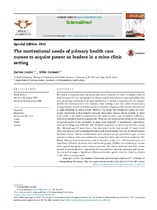| dc.contributor.author | Jooste, Karien | |
| dc.contributor.author | Hamani, Mida | |
| dc.date.accessioned | 2017-03-10T08:01:20Z | |
| dc.date.available | 2017-03-10T08:01:20Z | |
| dc.date.issued | 2017 | |
| dc.identifier.citation | Jooste, K. & Hamani, M. (2017). The motivational needs of primary health care nurses to acquire power as leaders in a mine clinic
setting. Health SA Gesondheid, 22: 43-51 | en_US |
| dc.identifier.issn | 1025-9848 | |
| dc.identifier.uri | | |
| dc.identifier.uri | http://hdl.handle.net/10566/2614 | |
| dc.identifier.uri | http://dx.doi.org/10.1016/j.hsag.2016.09.005 | |
| dc.description.abstract | Motivation is a process that influences and directs behaviour in order to satisfy a need. It links with goal 3 of the sustainable development goals that focus on ensuring healthy lives and promoting well-being at all ages. Motivation of nurses is important in the primary health care environment of, for instance, mine settings; since low levels of motivation among Primary Health Care (PHC) nurses could have a negative effect on the achievement of high standards in health service delivery. The study was conducted within the theoretical framework of McClelland's Acquired Motivation Theory which consists of three basic needs, - the need for achievement, the need for power, and the need for affiliation. One of the research questions posed was "What are the motivational needs of PHC nurses to acquire power in the workplace at mine clinic settings?" A quantitative, explorative, descriptive design was followed. The accessible population in this study was PHC nurses (N = 30) working at 13 mine clinics, that also served as the total sample. A 7 point Likert scale was used in a self-administered structured questionnaire that was developed from a literature review. Ethical considerations were adhered to and respondents gave written informed consent. Data was analysed by using descriptive and inferential statistics. The Mann-Whitney test compared the mean ranks and a p-value of p < 0.05 was indicative of a significant difference between male and female groups. Validity and reliability principles were applied during the entire research process. The results indicated that PHC nurses needed acknowledgement, organisational responsibility, strategic planning and promotion, as well as support. Significant differences between gender were not found in relation to the need to acquire power. | en_US |
| dc.language.iso | en | en_US |
| dc.publisher | AOSIS OpenJournals Publishing AOSIS (Pty) Ltd | en_US |
| dc.rights | Copyright © 2016, The Authors. Publishing services by Elsevier B.V. on behalf of Johannesburg University. This is an open
access article under the CC BY-NC-ND license (http://creativecommons.org/licenses/by-nc-nd/4.0/). | |
| dc.subject | Leader | en_US |
| dc.subject | Motivation | en_US |
| dc.subject | Power | en_US |
| dc.subject | Primary health care | en_US |
| dc.subject | Survey | en_US |
| dc.title | The motivational needs of primary health care
nurses to acquire power as leaders in a mine clinic
setting | en_US |
| dc.type | Article | en_US |
| dc.privacy.showsubmitter | FALSE | |
| dc.status.ispeerreviewed | TRUE | |
| dc.description.accreditation | DHET | en_US |

